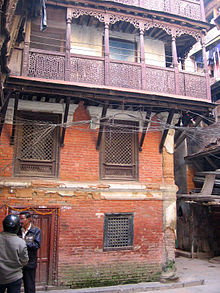


Dharma Man Tuladhar ( Nepali: धर्ममान तुलाधर) (August 4, 1862 – August 24, 1938) was a Nepalese trader and philanthropist [1] [2] best known for the renovation of the Swayambhu stupa in Kathmandu, one of the holiest Buddhist shrines in Nepal. [3]
Popularly known as Dhaman Sahu ( Newar: धमां साहु), Tuladhar headed the restoration project which lasted from 1918 to 1921. [4] This was the last complete renovation of Swayambhu before the recent restoration project which was finished in 2010. [5]
Business in Tibet
Tuladhar belonged to the Nyata ( Newar: न्यत) branch of Tuladhars. He was born in Nyata in the western part of Kathmandu and moved to Tanlachhi ( Newar: तंलाछि) in the early 1900s. His wife was Hera Laxmi Tuladhar. His father Buddha Bir Singh Tuladhar owned a business house in Lhasa, Tibet known as Chhusingsyar with branches in Gyantse and Phari and in Ladakh and Kolkata in India. [6] [7] Tuladhar traveled to Lhasa and lived there many years engaged as a trader. [8]
Following his return to Kathmandu in 1898, he devoted himself to supporting Buddhist causes. [9] He also hosted Tibetan lamas coming to Kathmandu on pilgrimage and made arrangements for them to give religious discourses, most notably Kyangtse Lama who arrived in Kathmandu in 1924. [10]
Restoration of Swayambhu
A Tibetan lama Sarvasri (Tokden) Sakyasri provided the inspiration to undertake the restoration of Swayambhu which Tuladhar began in 1918 after obtaining permission from the king and the prime minister. Tuladhar was one of the major donors to the project. Lamas and devotees from Nepal, Tibet, Bhutan and Sikkim also made large contributions. [11]
The entire stupa was refurbished. The spire was dismantled and redone. The central shaft was renewed. [12] Tuladhar sponsored the renovation of the upper portion of the stupa while brothers Harsha Sundar, Ram Sundar and Pushpa Sundar Tuladhar of Asan Dhalasikwa, Kathmandu bore the expenses of the nine shrines around its base.
The five Buddha shrines set into the dome were covered with gilt copper, a new statue of Vairocana Buddha was installed, and four new shrines were built to house statues of Tara. A row of prayer wheels were also installed all around the stupa. [13]
The chief engineer of the project was Jogbir Sthapit. The restoration lasted three years. Newar Buddhist priests and Tibetan lamas conducted separate religious ceremonies at Swayambhu before work began and after it was completed. [14]
Renovation of Kindo Baha
In 1926, Tuladhar sponsored the renovation of Kindo Baha, a 17th-century monastic courtyard located at the foot of Swayambhu hill, which was in near ruins. The monastery became a major center of Theravada Buddhism in the subsequent years. The movement to revive Theravada Buddhism in Nepal began here. The government cracked down by expelling the resident monks out of the country. [15] [16]
Imprisonment
Tuladhar's contribution to the revival of Theravada Buddhism angered the government. In 1931, he was fined with 11 other people including Buddhist teacher Dhammalok Mahasthavir and poets Chittadhar Hridaya and Yogbir Singh Kansakar for spreading an "unorthodox religion". [17]
Legacy
Dharma Man Tuladhar died at his home in Kathmandu in 1938. A stone stupa dedicated to his memory was built and consecrated in 1941 on the east side of the Shantipur Temple at Swayambhu.
See also
References
- ^ Sankrityayan, Mahapandit Rahul (1934) Tibet Mein Sava Baras. New Delhi: Sharda Mandir. Page 247.
- ^ LeVine, Sarah and Gellner, David N. (2005) Rebuilding Buddhism: The Theravada Movement in Twentieth-Century Nepal. Harvard University Press. ISBN 978-0-674-01908-9. Page 27.
- ^ Shrestha, Suresh Suras (2010). "People's Involvement in Heritage Conservation: Swayambhu Stupa Conservation" (PDF). Cultural Heritage Protection Office, Asia-Pacific Cultural Centre for UNESCO (ACCU). Archived from the original (PDF) on 22 July 2011. Retrieved 1 February 2011.
- ^ Shakya, Hem Raj. (2004) Sri Svayambhu Mahacaitya. Kathmandu: Svayambhu Vikash Mandala. ISBN 99933-864-0-5. Pages 313-319.
- ^ "Restoration of Swayambhu Stupa to complete in Feb 2010". The Rising Nepal. 11 February 2010. Archived from the original on 10 March 2012. Retrieved 3 February 2011.
- ^ Tuladhar, Sidhartha Man (1999). "Dharma Man Tuladhar and Pratek Man Tuladhar: Nepalese Traders in Tibet" (PDF). Postal Himal: Quarterly of the Nepal and Tibet Philatelic Study Circle. Nepal and Tibet Philatelic Study Circle. Archived from the original (PDF) on 6 April 2012. Retrieved 11 November 2011. Page 23.
- ^ Tuladhar, Kamal Ratna (10 March 2012). "Long ago in Ladakh". The Kathmandu Post. Retrieved 14 March 2012.[ permanent dead link]
- ^ LeVine, Sarah and Gellner, David N. (2005) Rebuilding Buddhism: The Theravada Movement in Twentieth-Century Nepal. Harvard University Press. ISBN 978-0-674-01908-9. Page 102.
- ^ Mahasthavir, Bhikshu Sudarshan (1998). "Role of Theravada in the Preservation of Newar Buddhism". Retrieved 2 February 2011.
- ^ Gellner, David N. (2004). "Gyanmala Bhajan (Devotional songs)". Lumbini Nepalese Buddha Dharma Society (UK). Archived from the original on 19 March 2012. Retrieved 1 February 2011.
- ^ Gutschow, Niels (1997). The Nepalese Caitya: 1500 Years of Buddhist Votive Architecture in the Kathmandu Valley. Edition Axel Menges. p. 92. ISBN 9783930698752. Retrieved 8 April 2014.
- ^ Chitrakar, Anil (August 2010). "Celebrating Swayambhu Restoration". ECS. Archived from the original on 22 October 2010. Retrieved 2 February 2011.
- ^ Shakya, Hem Raj. (2004) Sri Svayambhu Mahacaitya. Kathmandu: Svayambhu Vikash Mandala. ISBN 99933-864-0-5. Page 320.
- ^ Shakya, Hem Raj. (2004) Sri Svayambhu Mahacaitya. Kathmandu: Svayambhu Vikash Mandala. ISBN 99933-864-0-5. Pages 315-319.
- ^ LeVine, Sarah; Gellner, David N. (2005). Rebuilding Buddhism: The Theravada Movement in Twentieth-Century Nepal. Harvard University Press. ISBN 0-674-01908-3. Page 103.
- ^ Dietrich, Angela (1996). "Buddhist Monks and Rana Rulers: A History of Persecution". Buddhist Himalaya: A Journal of Nagarjuna Institute of Exact Methods. Archived from the original on 1 October 2013. Retrieved 9 November 2012.
- ^ LeVine, Sarah and Gellner, David N. (2005). Rebuilding Buddhism: The Theravada Movement in Twentieth-Century Nepal. Harvard University Press. ISBN 0-674-01908-3, ISBN 978-0-674-01908-9. Pages 40-41.